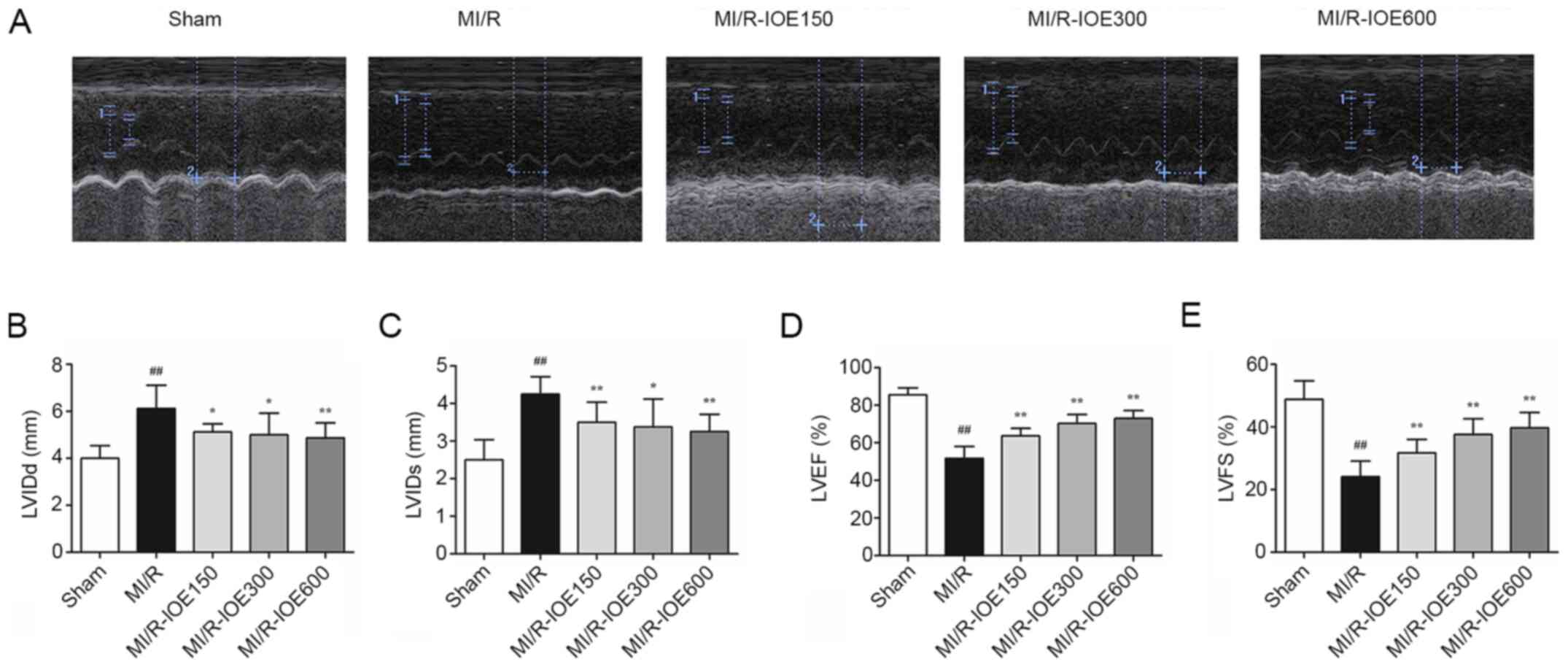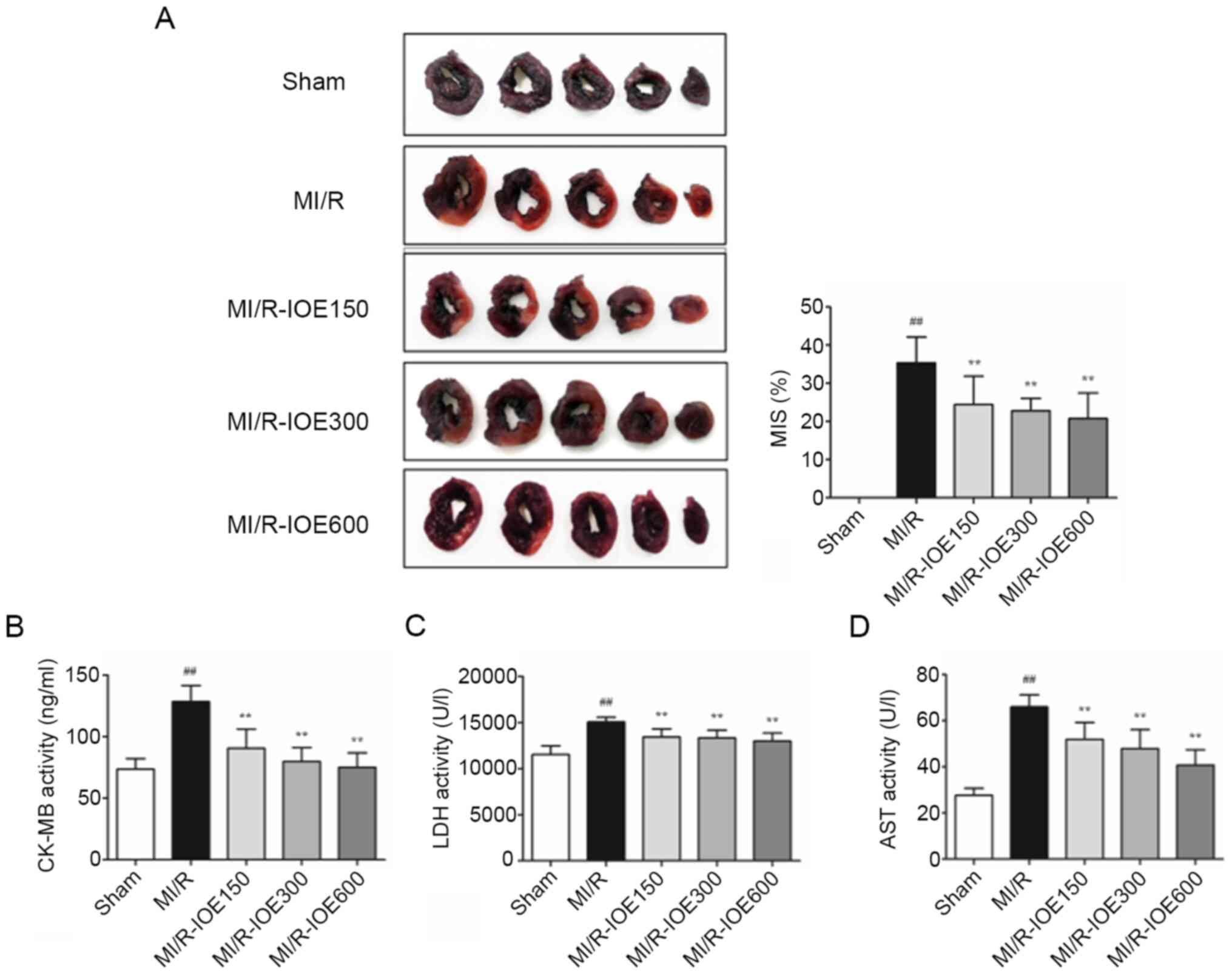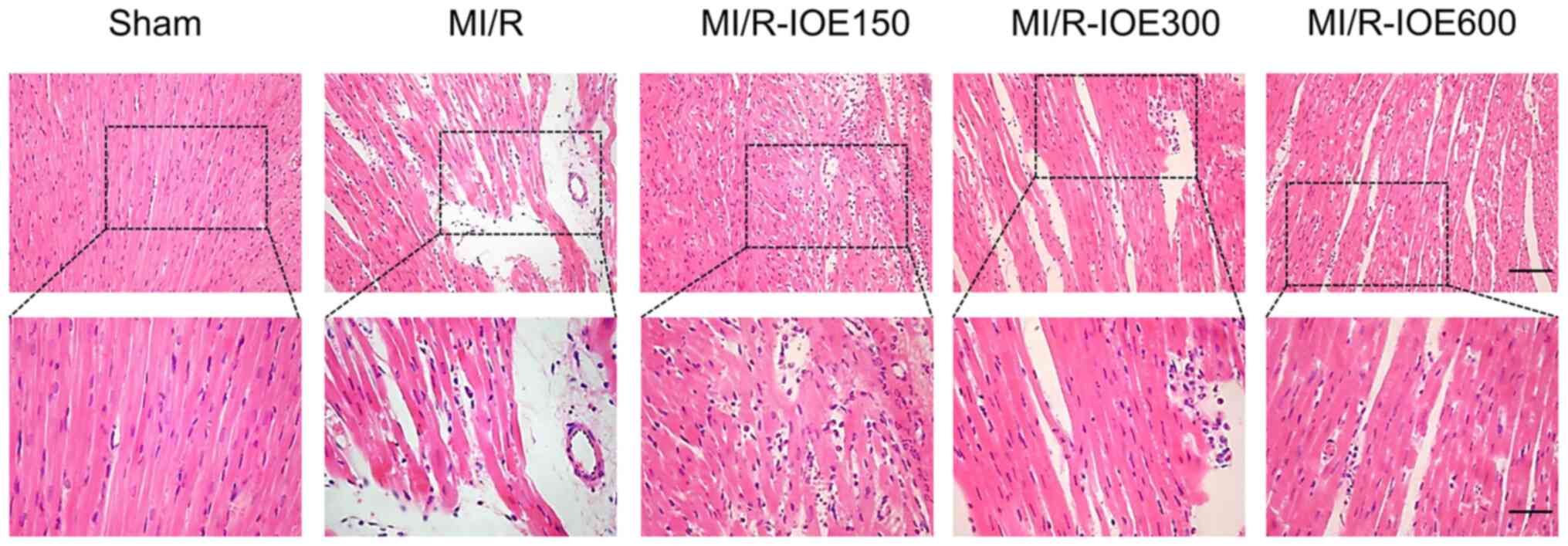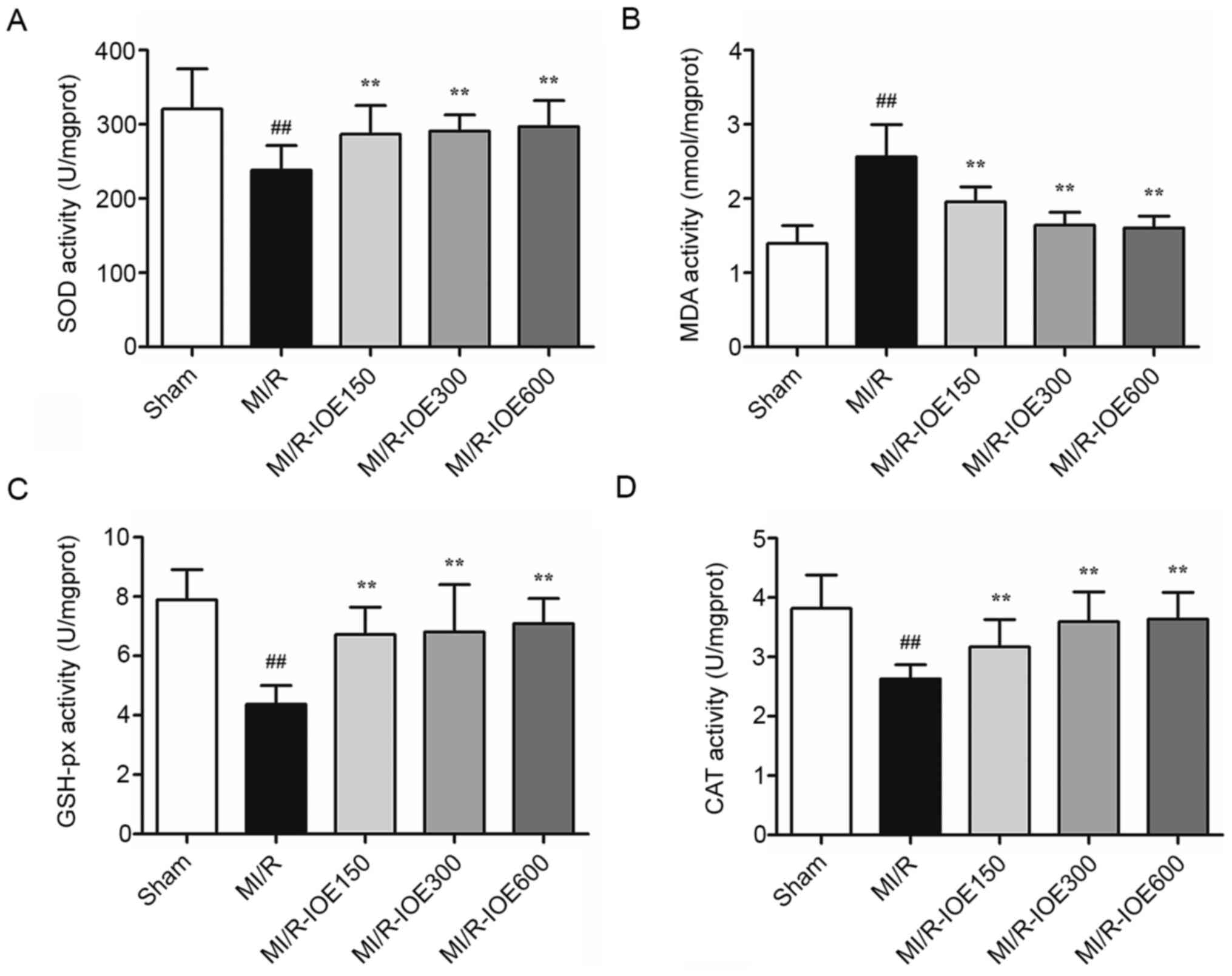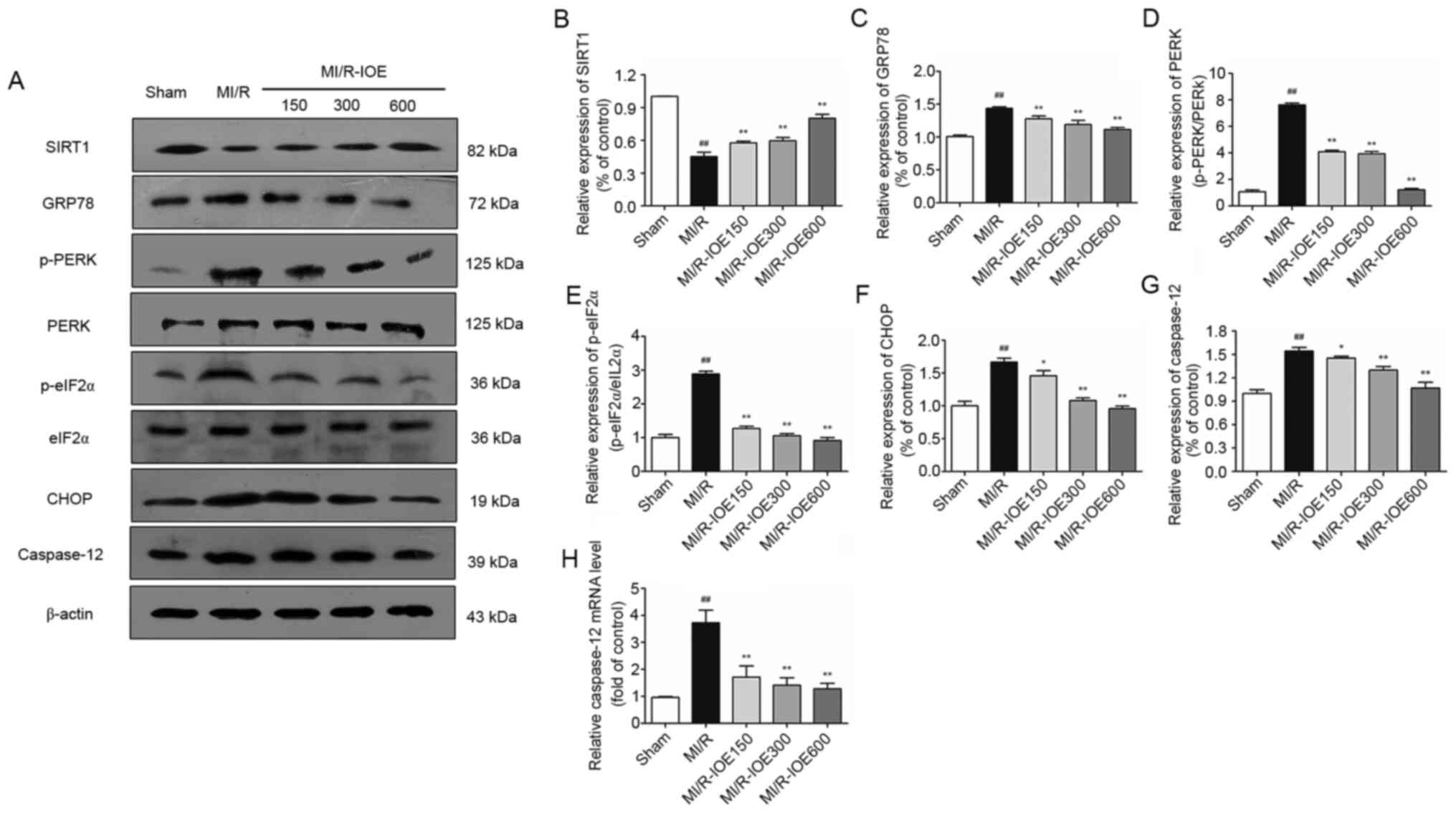|
1
|
Lu D and Thum T: RNA-based diagnostic and
therapeutic strategies for cardiovascular disease. Nat Rev Cardiol.
16:661–674. 2019. View Article : Google Scholar : PubMed/NCBI
|
|
2
|
Robin E, Guzy RD, Loor G, Iwase H, Waypa
GB, Marks JD, Hoek TL and Schumacker PT: Oxidant stress during
simulated ischemia primes cardiomyocytes for cell death during
reperfusion. J Biol Chem. 282:19133–19143. 2007. View Article : Google Scholar : PubMed/NCBI
|
|
3
|
Wang J, Hu X and Jiang H: ER
stress-induced apoptosis: A novel therapeutic target in myocardial
ischemia and reperfusion injury. Int J Cardiol. 214:233–234. 2016.
View Article : Google Scholar : PubMed/NCBI
|
|
4
|
Oakes SA and Papa FR: The role of
endoplasmic reticulum stress in human pathology. Annu Rev Pathol.
10:173–194. 2015. View Article : Google Scholar : PubMed/NCBI
|
|
5
|
Cao SS and Kaufman RJ: Endoplasmic
reticulum stress and oxidative stress in cell fate decision and
human disease. Antioxid Redox Signal. 21:396–413. 2014. View Article : Google Scholar : PubMed/NCBI
|
|
6
|
Lee AS: GRP78 induction in cancer:
Therapeutic and prognostic implications. Cancer Res. 67:3496–3499.
2007. View Article : Google Scholar : PubMed/NCBI
|
|
7
|
Harding HP, Zhang Y and Ron D: Protein
translation and folding are coupled by an
endoplasmic-reticulum-resident kinase. Nature. 397:271–274. 1999.
View Article : Google Scholar : PubMed/NCBI
|
|
8
|
Harding HP, Novoa I, Zhang Y, Zeng H, Wek
R, Schapira M and Ron D: Regulated translation initiation controls
stress-induced gene expression in mammalian cells. Mol Cell.
6:1099–1108. 2000. View Article : Google Scholar : PubMed/NCBI
|
|
9
|
Li X, Wang Y, Wang H, Huang C, Huang Y and
Li J: Endoplasmic reticulum stress is the crossroads of autophagy,
inflammation, and apoptosis signaling pathways and participates in
liver fibrosis. Inflamm Res. 64:1–7. 2015. View Article : Google Scholar : PubMed/NCBI
|
|
10
|
Singh V and Ubaid S: Role of Silent
Information Regulator 1 (SIRT1) in Regulating Oxidative Stress and
Inflammation. Inflammation. 43:1589–1598. 2020. View Article : Google Scholar : PubMed/NCBI
|
|
11
|
Luo G, Jian Z, Zhu Y, Zhu Y, Chen B, Ma R,
Tang F and Xiao Y: Sirt1 promotes autophagy and inhibits apoptosis
to protect cardiomyocytes from hypoxic stress. Int J Mol Med.
43:2033–2043. 2019.PubMed/NCBI
|
|
12
|
Prola A, Pires Da Silva J, Guilbert A,
Lecru L, Piquereau J, Ribeiro M, Mateo P, Gressette M, Fortin D,
Boursier C, et al: SIRT1 protects the heart from ER stress-induced
cell death through eIF2α deacetylation. Cell Death Differ.
24:343–356. 2017. View Article : Google Scholar : PubMed/NCBI
|
|
13
|
Wasser SP: Medicinal Mushroom Science:
History, Current Status, Future Trends, and Unsolved Problems. Int
J Med Mushrooms. 12:1–16. 2010. View Article : Google Scholar
|
|
14
|
Lee I-K and Yun B-S: Styrylpyrone-class
compounds from medicinal fungi Phellinus and Inonotus
spp., and their medicinal importance. J Antibiot (Tokyo).
64:349–359. 2011. View Article : Google Scholar : PubMed/NCBI
|
|
15
|
Javed S, Mitchell K, Sidsworth D, Sellers
SL, Reutens-Hernandez J, Massicotte HB, Egger KN, Lee CH and Payne
GW: Inonotus obliquus attenuates histamine-induced
microvascular inflammation. PLoS One. 14:e02207762019. View Article : Google Scholar : PubMed/NCBI
|
|
16
|
Fan L, Ding S, Ai L and Deng K: Antitumor
and immunomodulatory activity of water-soluble polysaccharide from
Inonotus obliquus. Carbohydr Polym. 90:870–874. 2012.
View Article : Google Scholar : PubMed/NCBI
|
|
17
|
National Research Council (US) Committee
for the Update of the Guide for the Care and Use of Laboratory
Animals. Guide for the Care and Use of Laboratory Animals. 8th
edition. National Academies Press; Washington, DC: 2011, PubMed/NCBI
|
|
18
|
Livak KJ and Schmittgen TD: Analysis of
relative gene expression data using real-time quantitative PCR and
the 2(T)(-Delta Delta C) method. Methods. 25:402–408. 2001.
View Article : Google Scholar : PubMed/NCBI
|
|
19
|
Balandaykin ME and Zmitrovich IV: Review
on Chaga Medicinal Mushroom, Inonotus obliquus (Higher
Basidiomycetes): Realm of Medicinal Applications and Approaches on
Estimating its Resource Potential. Int J Med Mushrooms. 17:95–104.
2015. View Article : Google Scholar : PubMed/NCBI
|
|
20
|
Liang L, Zhang Z, Sun W and Wang Y: Effect
of the Inonotus obliquus polysaccharides on blood lipid
metabolism and oxidative stress of rats fed high-fat diet in vivo.
Proceedings of the 2009 2nd International Conference on Biomedical
Engineering and Informatics. IEEE; New York, NY: pp. 1114–1117.
2009
|
|
21
|
Kalogeris T, Baines CP, Krenz M and
Korthuis RJ: Ischemia/Reperfusion. Compr Physiol. 7:113–170. 2016.
View Article : Google Scholar : PubMed/NCBI
|
|
22
|
Horwitz LD, Wallner JS, Decker DE and
Buxser SE: Efficacy of lipid soluble, membrane-protective agents
against hydrogen peroxide cytotoxicity in cardiac myocytes. Free
Radic Biol Med. 21:743–753. 1996. View Article : Google Scholar : PubMed/NCBI
|
|
23
|
Raedschelders K, Ansley DM and Chen DD:
The cellular and molecular origin of reactive oxygen species
generation during myocardial ischemia and reperfusion. Pharmacol
Ther. 133:230–255. 2012. View Article : Google Scholar : PubMed/NCBI
|
|
24
|
He L, He T, Farrar S, Ji L, Liu T and Ma
X: Antioxidants Maintain Cellular Redox Homeostasis by Elimination
of Reactive Oxygen Species. Cell Physiol Biochem. 44:532–553. 2017.
View Article : Google Scholar : PubMed/NCBI
|
|
25
|
Fu WW, Xu HL, Yu XF, Lyu C, Tian Y, Guo M,
Sun J and Sui D: 20(S)-Ginsenoside Rg2 attenuates myocardial
ischemia/reperfusion injury by reducing oxidative stress and
inflammation: Role of SIRT1. Rsc Adv. 8:23947–23962. 2018.
View Article : Google Scholar
|
|
26
|
Hotchkiss RS, Strasser A, McDunn JE and
Swanson PE: Cell death. N Engl J Med. 361:1570–1583. 2009.
View Article : Google Scholar : PubMed/NCBI
|
|
27
|
Malhotra JD, Miao H, Zhang K, Wolfson A,
Pennathur S, Pipe SW and Kaufman RJ: Antioxidants reduce
endoplasmic reticulum stress and improve protein secretion. Proc
Natl Acad Sci USA. 105:18525–18530. 2008. View Article : Google Scholar : PubMed/NCBI
|
|
28
|
Hetz C: The unfolded protein response:
Controlling cell fate decisions under ER stress and beyond. Nat Rev
Mol Cell Biol. 13:89–102. 2012. View
Article : Google Scholar : PubMed/NCBI
|
|
29
|
Louessard M, Bardou I, Lemarchand E,
Thiebaut AM, Parcq J, Leprince J, Terrisse A, Carraro V, Fafournoux
P, Bruhat A, et al: Activation of cell surface GRP78 decreases
endoplasmic reticulum stress and neuronal death. Cell Death Differ.
24:1518–1529. 2017. View Article : Google Scholar : PubMed/NCBI
|
|
30
|
Taniuchi S, Miyake M, Tsugawa K, Oyadomari
M and Oyadomari S: Integrated stress response of vertebrates is
regulated by four eIF2α kinases. Sci Rep. 6:328862016. View Article : Google Scholar : PubMed/NCBI
|
|
31
|
Tabas I and Ron D: Integrating the
mechanisms of apoptosis induced by endoplasmic reticulum stress.
Nat Cell Biol. 13:184–190. 2011. View Article : Google Scholar : PubMed/NCBI
|
|
32
|
Nakagawa T, Zhu H, Morishima N, Li E, Xu
J, Yankner BA and Yuan J: Caspase-12 mediates
endoplasmic-reticulum-specific apoptosis and cytotoxicity by
amyloid-beta. Nature. 403:98–103. 2000. View Article : Google Scholar : PubMed/NCBI
|
|
33
|
Fan TJ, Han LH, Cong RS and Liang J:
Caspase family proteases and apoptosis. Acta Biochim Biophys Sin
(Shanghai). 37:719–727. 2005. View Article : Google Scholar : PubMed/NCBI
|
|
34
|
Yang Y, Duan W, Li Y, Jin Z, Yan J, Yu S
and Yi D: Novel role of silent information regulator 1 in
myocardial ischemia. Circulation. 128:2232–2240. 2013. View Article : Google Scholar : PubMed/NCBI
|
|
35
|
Hetz C, Chevet E and Harding HP: Targeting
the unfolded protein response in disease. Nat Rev Drug Discov.
12:703–719. 2013. View Article : Google Scholar : PubMed/NCBI
|
|
36
|
Winnik S, Auwerx J, Sinclair DA and Matter
CM: Protective effects of sirtuins in cardiovascular diseases: From
bench to bedside. Eur Heart J. 36:3404–3412. 2015. View Article : Google Scholar : PubMed/NCBI
|
|
37
|
Liu LQ, Fan ZQ, Tang YF and Ke ZJ: The
resveratrol attenuates ethanol-induced hepatocyte apoptosis via
inhibiting ER-related caspase-12 activation and PDE activity in
vitro. Alcohol Clin Exp Res. 38:683–693. 2014. View Article : Google Scholar : PubMed/NCBI
|
|
38
|
Hubbard BP, Gomes AP, Dai H, Li J, Case
AW, Considine T, Riera TV, Lee JE, E SY, Lamming DW, et al:
Evidence for a common mechanism of SIRT1 regulation by allosteric
activators. Science. 339:1216–1219. 2013. View Article : Google Scholar : PubMed/NCBI
|
|
39
|
Ron D and Walter P: Signal integration in
the endoplasmic reticulum unfolded protein response. Nat Rev Mol
Cell Biol. 8:519–529. 2007. View Article : Google Scholar : PubMed/NCBI
|
|
40
|
Pires Da Silva J, Monceaux K, Guilbert A,
Gressette M, Piquereau J, Novotova M, Ventura-Clapier R, Garnier A
and Lemaire C: SIRT1 Protects the Heart from ER Stress-Induced
Injury by Promoting eEF2K/eEF2-Dependent Autophagy. Cells.
9:4262020. View Article : Google Scholar
|
|
41
|
Hsu YJ, Hsu SC, Hsu CP, Chen YH, Chang YL,
Sadoshima J, Huang SM, Tsai CS and Lin CY: Sirtuin 1 protects the
aging heart from contractile dysfunction mediated through the
inhibition of endoplasmic reticulum stress-mediated apoptosis in
cardiac-specific Sirtuin 1 knockout mouse model. Int J Cardiol.
228:543–552. 2017. View Article : Google Scholar : PubMed/NCBI
|















